Iran Says It Won’t Expand War But It Will ‘Inevitably’ Expand
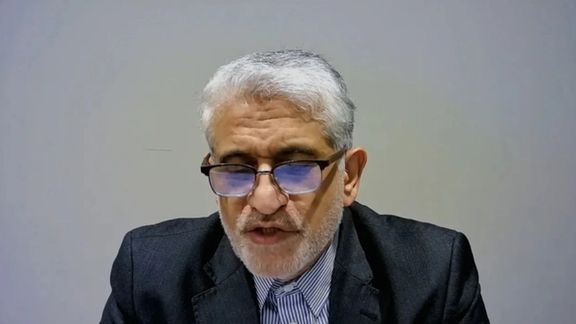
Iran continues to send mixed messages on the Hamas-Israel war, saying to the United Nations that it does not seek to escalate the war, but it inevitably will.

Iran continues to send mixed messages on the Hamas-Israel war, saying to the United Nations that it does not seek to escalate the war, but it inevitably will.
Amir Saeid Iravani, Iran's ambassador to the United Nations, told CNN Thursday that his government has “insisted that we are not going to expand this war front.”
He also claimed Tehran has nothing to do with attacks against US forces mushrooming across the region since Hamas declared war on Israel. “We have said very clearly that Iran is not involving in any attack against the United States forces in the region.”
Earlier in the day, Iran’s Foreign Minister Hossein Amir-Abdollahian said the continuation of Israel’s retaliatory offensive against Hamas would inevitably lead to an expansion of the conflict.
Such conflicting statements by the Iranian regime have been recurring since October 7, when the Tehran-backed Islamist militants killed 1,400 people, mostly civilians in Israel and ignited the current crisis. Israel has been pounding the enclave to uproot the Islamist group, which has made the war exceedingly bloody hiding deep among the civilian population and underneath the coastal sliver’s non-military facilities.
Iran supports Hamas but says it did not play any role in the October 7 attack. Iran also backs the Hezbollah, a Lebanese militant group that has deep ties with Hamas and Islamic Jihad, another Palestinian faction in Gaza that is also backed by Iran.
Iran provides support to militant groups, giving arms and training in overt and covert ways.
Pentagon deputy press secretary Sabrina Singh said on Thursday that the US forces have been attacked 46 times since October 17. That includes 24 attacks in Iraq and 22 in Syria, she added. A total of 56 troops have been injured in the attacks, the Pentagon says.
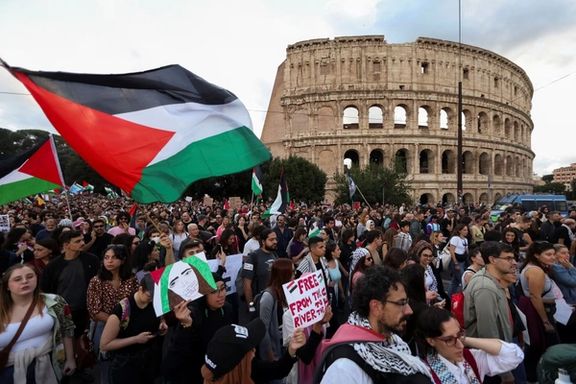
A senior official in Iran has said that Supreme Leader Ali Khamenei and Hezbollah leader Hassan Nasrallah have launched a “war of attrition” to destroy Western civilization.
Alireza Panahian, a cleric and senior official in Khamenei’s office, was quoted by local media as saying during a television program that “With Israel’s destruction, Zionism will not disappear. Currently, Hassan Nasrallah and our leader are waging a war of attrition to uproot it. Western civilization will be destroyed by a war of attrition in this region.”
Panahian is known as a speaker for Khamenei’s office, and he would hardly make such statements without coordination with the Supreme Leader’s inner circle. Usually, Iranian politicians, commentators and media take Panahian’s statements as indication of what Khamenei wants to convey to the public.
Since the October 7 brutal Hamas attack against Israeli border towns, the Jewish state has reacted with overwhelming force, first bombing hundreds of targets in Gaza and then starting a ground invasion of the northern part of the enclave. Israel has declared that the aim of the operation is to eradicate Hamas. Some commentators have argued that Iran did not expect such a strong reaction and overwhelming Western support for Israel.
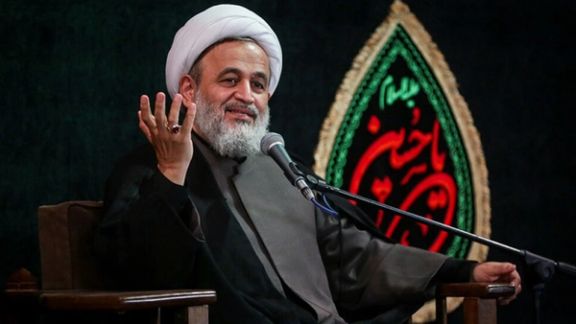
The Islamic Republic has been backing Hamas and other Islamist Palestinian groups financially and militarily for the past two decades. Hamas officials have thanks the Iranian regime for its support. It is generally believed that militant Palestinian group would not have launched its terror attack on Israel on October 7 without the knowledge and approval of the Iranian regime.
In addition, the Iranian government celebrated the attack that killed more than 1,000 civilians in Israel and kidnapped more than 200 others. Tehran’s actions and contradictory statements since then have provided more signs of its strong support for Hamas’ actions.
Panahian added that the Western strategy is based on quick victories, but a long war is not part of their culture. He emphasized that followers of Shiite Iran will be the victors of a long conflict.
Asked if he supports a ceasefire, Panahian said, “Yes, a ceasefire in these conditions without the victory of the Zionists is detrimental to them. However, the point is that Hamas, Hezbollah in Lebanon, Yemen, and the resistance do not unveil all their capabilities. This means that a ceasefire poses a significant threat hanging over their heads."
This remark would reinforce the arguments of those who are against a ceasefire at this point, which they say would enable Hamas to survive, regroup and continue terror attacks.
Panahian’s theory of Iran waging a war of attrition is partly based on the calculation that eventually countries will put enough pressure on Israel to agree to a ceasefire before a decisive Hamas defeat.
However, it could also be public posturing to demonstrate that Tehran did not miscalculate in allowing or planning the October 7 attack, since it has decided to mostly watch Hamas’ possible destruction from the sidelines. After all, the Iranian regime has an audience of hardliners at home and allies and proxies in the region and cannot afford to look weak and confused.
Walter Russel Mead argued in an opinion piece in The Wall Street Journal that Iran’s real goal of allowing the Hamas operation was to disrupt Saudi Israeli normalization talks.
“But so far, from a global perspective, the most important fact is that Iran isn’t getting what it wanted from the war. Iran’s objective in arming, training and encouraging Hamas wasn’t solely to cause Israel pain. The real goal was to disrupt the gradual deepening of the strategic ties between Israel and its most important Arab neighbors,” Mead maintained.
He highlighted that countries like Egypt, Saudi Arabia and the United Arab Emirates “have all signaled that they intend, once the storm has passed, to go on working with Jerusalem for a safer, more stable Middle East. Worse from Iran’s point of view, the Arabs are committing to a revived form of Palestinian governance that can exclude Iran’s proxies from both the West Bank and Gaza.”
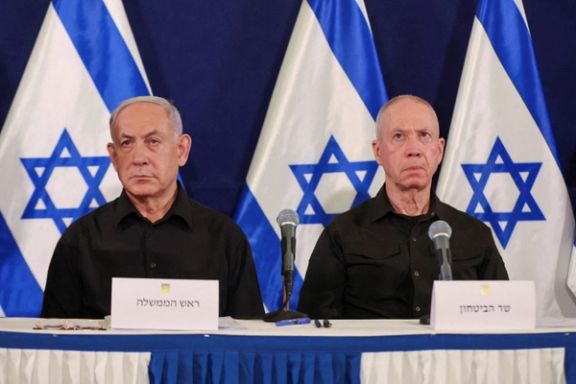
Israel says the war will continue until the eradication of Hamas, underlining that the future of the region and the world depends on the outcome of the conflict.
Israeli Prime Minister Benjamin Netanyahu, in an exclusive interview with Fox News on Thursday, declared that this is a war between “the entire civilized world and barbarism,” noting that a victory by Iran’s axis of terror -- including Hamas, Hezbollah, and Houthis-- will plunge the region and the world into a dark era.
Admitting that Israel’s retaliatory offensive into Gaza is “taking a little longer than” he had hoped, he highlighted that Israel would not agree to a ceasefire because “our future, the future of our neighbors, the future of Palestinians and the future of the world is related to who wins.”
“Does the axis of terror of Iran, Hezbollah, and Houthis win? Or do the forces of progress and prosperity – Israel, the US, the modern Arab states win?” he said, adding that if “the bad guys” win, “they can cast the Middle East and the entire world into another period of dark ages.”
"A cease-fire with Hamas means surrender to Hamas, surrender to terror and the victory of the Iran's axis of terror, so there won't be a cease-fire without the release of Israeli hostages," he insisted.
"We don't seek to conquer Gaza, we don't seek to occupy Gaza, and we don't seek to govern Gaza," Netanyahu said, adding that “we have to have a credible force that, if necessary, will enter Gaza and kill the killers. Because that's what will prevent the reemergence of a Hamas-like entity.”
Washington has said it would oppose Israeli post-war occupation of Gaza, where Israel has waged a bombing campaign to destroy the enclave's Hamas rulers after militants rampaged through southern Israeli communities on October 7 in an attack that Israel says killed 1,400 mostly civilians.

Undeterred Iran proxies have launched four attacks on American troops the day after US fighter jets struck an IRGC arms depot in Syria.
A Pentagon spokesperson confirmed that three personnel were lightly injured in the attacks, bringing the number of US military injuries to almost 60 in a total of 46 drone and rocket attacks since October 17.
The US airstrike in Syria early hours of Thursday was meant to be a warning shot. US Secretary of Defense Lloyd Austin said in his statement following the operation, “we urge against any escalation."
Iran and its proxies seem to have ignored the message.
Iran’s foreign minister told his Qatari counterpart that “with the intensification of the war on civilians in Gaza, expansion of the scope of the war has now become inevitable.”
Israel's military said a group in Syria launched a drone that hit a school in the southern Israeli city of Eilat on Thursday and that it struck the group in response.
The Israeli military did not say what organization in Syria had launched the drone toward Eilat, on the Red Sea approximately 400 kms (250 miles) from the nearest point in Syrian territory.
But it said in a statement it holds Syria's government fully responsible "for any terror activity emanating from its territory." There were no reports of injuries from the drone strike, which caused light damage.
Iraqi militias have explicitly stated that they will carry on attacking American targets while the US government lends its unconditional support to Israel’s onslaught on Gaza.
And Houthis in Yemen continue to launch missiles at Israel.
US officials say they hold the regime in Iran to be ultimately responsible for all such attacks. But many in Washington seem to believe that the administration’s response is too little, if not too late.
“The Biden administration sends a message of weakness when it refuses to enforce the oil sanctions on Iran,” said Senator John Kennedy to Fox News Thursday. “[They] think if we're just nice guys, that we can be partners with Iran. And we can't.”
Biden’s Iran policy came under attack in the Republican presidential debate Thursday night. All candidates called for tougher actions. Senator Tim Scott was perhaps the one with the harshest comment.
“If you want to make a difference,” he said, “you cannot continue to have strikes in Syria on warehouses, you have to cut off the head of the snake. And the head of the snake is Iran."
Former president Trump, who is running for President again, also weighed in on the subject in an interview Thursday night –blaming it all on the Biden administration.
“This [war] is something that would have never happened with me,” he claimed. “We were actually getting along well with Iran. We would have had a deal with Iran; and they didn’t have the funds to do what they’re doing now… they were broke. There were a lot of problems with Hezbollah… they were all complaining that they’re not getting any money. That was a good thing."
Iranian officials have been warning of a full-scale regional war ever since Israel attacked Gaza in response to Hamas’ unprecedented operation inside Israel that killed 1400.
Yemen's Iran-aligned Houthi movement has also launched repeated missile and drone attacks on Israel since October 7, all of which were either shot down or fell short.
On Thursday, the Houthis, which govern swathes of Yemen including the capital Sanaa, said they fired ballistic missiles at various Israeli targets including what the group's military spokesperson described as military targets in Eilat.
Israel's military said its "Arrow" air defense system intercepted a missile launched at Israeli territory near the Red Sea, and that its Patriot defense system had intercepted a "suspicious target" in the southern Negev desert.
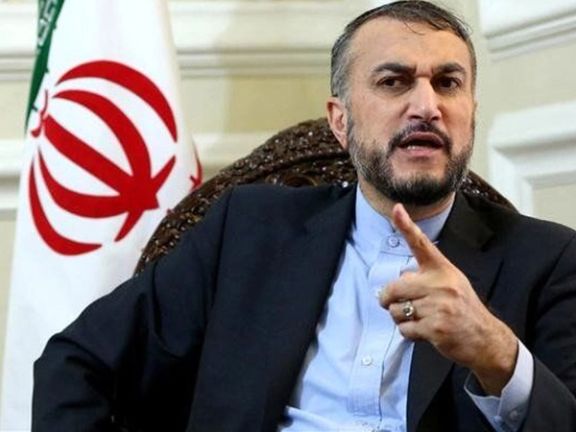
Iran’s foreign minister has reiterated that the continuation of Israel’s retaliatory offensive against Hamas would inevitably lead to an expansion of the conflict.
Hossein Amir-Abdollahian made the comment in a telephone conversation with his Qatari counterpart Sheikh Mohammed Bin Abdulrahman Al Thani on Thursday. The statement could ramp up concerns over whether Washington's diplomatic efforts and deployment of US naval forces to the eastern Mediterranean will be able to keep the conflict from further destabilizing the Middle East.
"Due to the expansion of the intensity of the war against Gaza's civilian residents, expansion of the scope of the war has become inevitable," Amir-Abdollahian said, according to Iranian state media.
Iran has made similar statements in the past four weeks as its ally Hamas has come under attack by Israel but Tehran has chosen not to get directly involved so far.
Hamas-run Ministry of Health said an Israeli strike hit a courtyard in the Al Shifa hospital, causing causalities without providing details. Israel said Hamas has hidden command centers and tunnels beneath Al Shifa, and other hospitals such as the Indonesian Hospital.
"While the world sees neighborhoods with schools, hospitals, scout groups, children’s playgrounds and mosques, Hamas sees an opportunity to exploit," Israel's military said in a statement.
Israel has been pounding the enclave to uproot the Islamist group, which has made the war exceedingly bloody hiding deep among the civilian population and underneath the coastal sliver’s non-military facilities.
Iran supports Hamas but says it did not play any role in the Islamist militants' October 7 terror attack that triggered the current crisis. Iran also backs the Hezbollah, a Lebanese militant group that has deep ties with Hamas and Islamic Jihad, another Palestinian faction in Gaza that is also backed by Iran.
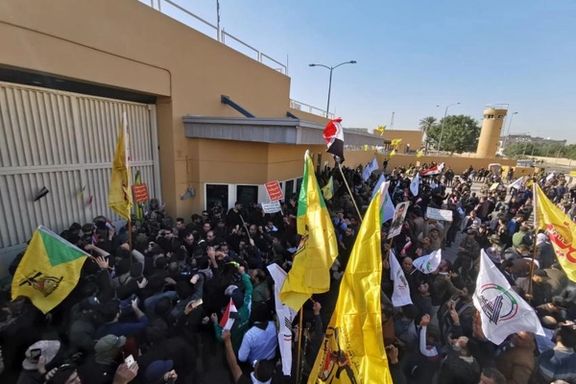
A Pentagon official speaking to Iran International on Thursday, denied an attack on the US embassy in Baghdad, but confirmed that Harir military base in Iraqi Kurdistan was targeted.
The official who requested anonymity said the attack north of Erbil inflicted no damage or casualties. Iran International’s sources in northern Iraq confirmed explosion at Harir base, but there was no information on casualties.
Earlier on Thursday, Iraqi militant groups back by Iran had claimed that they targeted the US embassy in Baghdad and others reported hearing explosion, but the Pentagon official dismissed these claims.
Sine the October 7 terror attack on Israel by Hamas, Iran’s armed proxy groups in the region have targeted US forces in Syria and Iraq more than 40 times. The United States has retaliated twice, bombing weapons storge facilities in Syria belonging to Iran’s Revolutionary Guard and their militia forces. The limited response has failed to deter Iran and its proxies.
Iran’s proxies attacked US forces in the region regularly since 2018, when Washington pulled out of the 2015 nuclear deal and imposed sanctions. These attacks intensified in December 2019 leading to the targeted killing of Qassem Soleimani, Iran’s top operator in the region, by orders of President Donald Trump.
However, in the past one year the attacks subsided apparently because Iran was negotiating with the Biden administration for unblocking billions of dollars of its frozen funds abroad. In June and August, the US agreed to unfreeze more than eight billion dollars blocked in Iraq and South Korea.